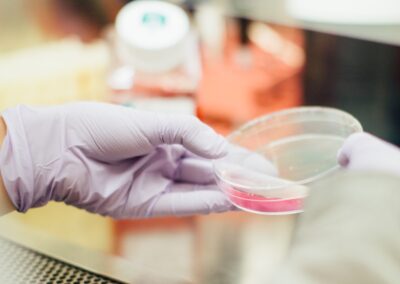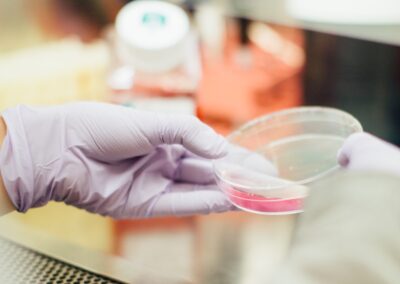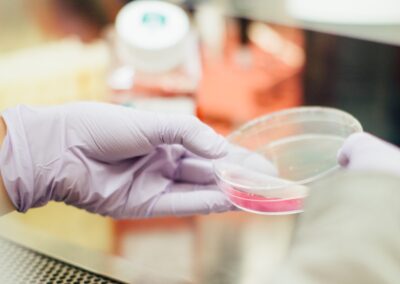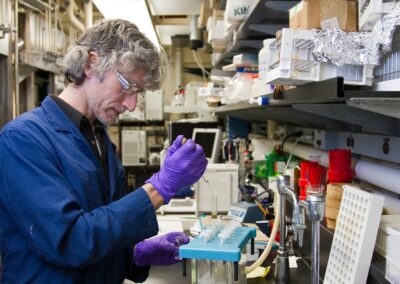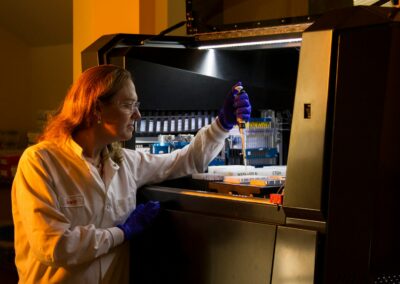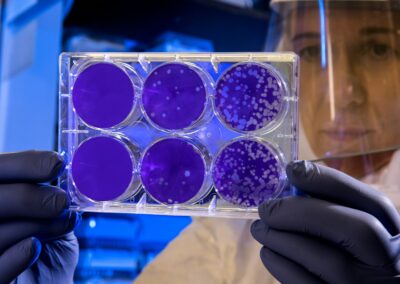Innovations in Saudi Arabia and the UAE
Synthetic biology for pharmaceuticals represents a groundbreaking approach in biotechnology, enabling the production of high-value drugs through the precise engineering of cellular systems. Synthetic biology involves designing and constructing new biological parts, devices, and systems, or re-designing existing natural biological systems for useful purposes. This innovative field has immense potential for revolutionizing the pharmaceutical industry by creating more efficient, cost-effective, and sustainable methods of drug production. In Saudi Arabia and the UAE, where healthcare innovation is a strategic priority, synthetic biology is paving the way for advancements in the pharmaceutical sector.
Researchers utilize synthetic biology to engineer cells, particularly microorganisms like bacteria and yeast, to produce complex pharmaceuticals and biopharmaceuticals. By inserting specific genes into these cells, scientists can instruct them to manufacture therapeutic proteins, enzymes, and other bioactive compounds. This method offers a more controlled and scalable alternative to traditional drug synthesis methods, which often involve complex chemical processes and expensive raw materials. In research institutions in Riyadh and Dubai, synthetic biology is being harnessed to develop new treatments for diseases such as cancer, diabetes, and rare genetic disorders.
Economic and Healthcare Benefits
The economic and healthcare benefits of utilizing synthetic biology for pharmaceutical production are substantial. One of the most significant advantages is the potential for cost reduction in drug manufacturing. Traditional pharmaceutical production methods can be prohibitively expensive due to the high costs of raw materials, labor, and complex synthesis processes. Synthetic biology offers a more cost-effective alternative by leveraging engineered cells as biological factories that can produce high-value compounds at a lower cost. In Riyadh and Dubai, where healthcare spending is a key priority, the adoption of synthetic biology can lead to more affordable medications and reduce the financial burden on healthcare systems.
Additionally, synthetic biology allows for greater scalability in drug production. Once an engineered cell line is created, it can be cultivated in large bioreactors to produce significant quantities of the desired pharmaceutical compound. This scalability is particularly beneficial for meeting the growing global demand for biopharmaceuticals, such as vaccines and biologics. In Saudi Arabia and the UAE, where public health initiatives and preventive medicine are central to national healthcare strategies, the ability to produce large volumes of essential medications can enhance public health preparedness and response capabilities.
Driving Innovation Through Strategic Leadership
Effective leadership and strategic management are critical for advancing synthetic biology applications in pharmaceutical production. In Saudi Arabia and the UAE, business executives, mid-level managers, and entrepreneurs play a pivotal role in fostering innovation and ensuring the successful implementation of these advanced biotechnological solutions. Executive coaching services and management consulting firms can provide essential support in developing the leadership skills needed to navigate the complexities of biotech innovation. By promoting a culture of continuous learning and adaptability, leaders can drive the successful integration of synthetic biology in pharmaceutical manufacturing practices.
Strategic communication is another vital component of effective leadership in this context. Leaders must communicate the benefits and potential risks of synthetic biology applications to various stakeholders, including healthcare providers, regulatory bodies, and the public. Transparent and clear communication helps build trust and facilitates the acceptance and adoption of new technologies. In Riyadh and Dubai, fostering open dialogue about the advancements and ethical considerations of synthetic biology can enhance public understanding and support for these innovative healthcare solutions.
Project management skills are also critical for overseeing the development and implementation of synthetic biology-based pharmaceutical projects. Leaders must manage complex initiatives that involve research, regulatory approval, and commercialization. Effective project management ensures that these projects are developed efficiently, meet regulatory standards, and are delivered to the market in a timely manner. In the UAE and Saudi Arabia, where large-scale medical research projects are common, strong project management capabilities are key to the successful advancement of synthetic biology in pharmaceutical production.
#SyntheticBiology #Pharmaceuticals #Biopharmaceuticals #Biotechnology #SaudiArabia #UAE #Riyadh #Dubai #AI #Blockchain #ExecutiveCoaching #ManagementConsulting #BusinessSuccess #Leadership #ProjectManagement






